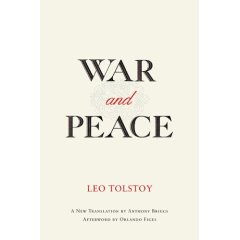Reading War and Peace

My third time reading Tolstoy's epic moves quite swiftly--the story itself may not be the most captivating, like The Master and Margarita (my all-time favorite piece of literature), but it affords a tapestry of the society and its throbbing life. By the end of Part 2 in Book 1, we see extensive scenes of domestic life, familial dealings, and seditious plot of seizing a count's fortune. All these are juxtaposed with scenes of the war. It might be a presentiment of the imminent changing fortunes of all the characters.
The bloggers at Reading...War and Peace raise a very broad but significant question: What is the novel about? Tolstoy gives us a diverse picture of characters who come to grasp their fate and destiny--whether it was out of free will or not. For some conforming to fate will deprive them of all power of thought and make them incapable of anything but habitual compliance. Tolstoy might have exposed readers the military schemes, familial gatherings, and domestic life, he doesn't show us the characters' fate and their decision--decision that leads to happiness and filfillment of life. We are, therefore, in the same shoes with the characters to gingerly, with fear and trembling, to see what's in store for them.
3 Comments:
I have huge admiration who sits down to read that monster for the third time in his life. I can't wait to read it for the first time.
Jordan:
Thanks. Like Italo Calvino says, the timing makes every reading of a novel unqiue. A certain part of the book might appeal to you because it truly hits home and bespeaks your mind.
So is this reading of W&P. I'm on p.465 and pondering about living for myself vs. living for others.
I am looking forward to getting farther into the novel--I am just starting out and trying to sort out characters at this point. I suspect I will be reading it slowly--hopefully a bit each day.
Post a Comment
<< Home